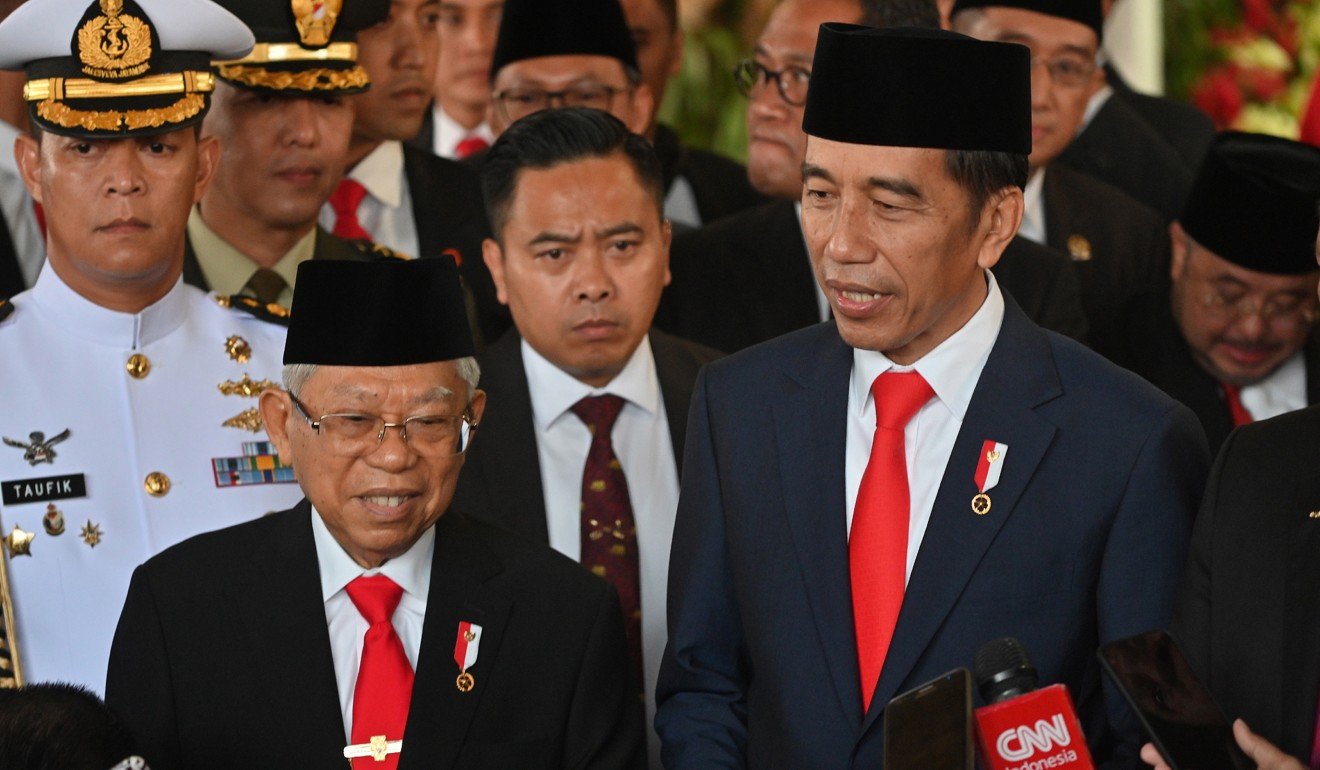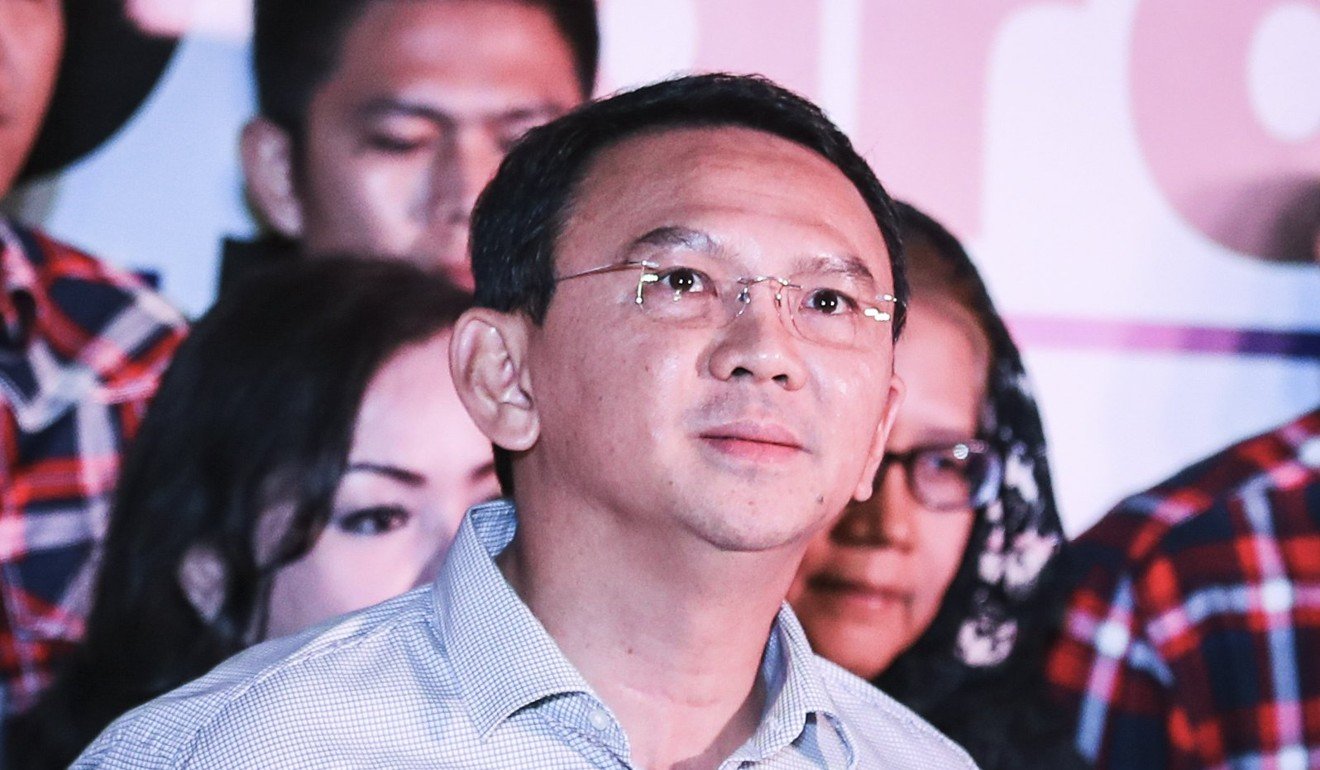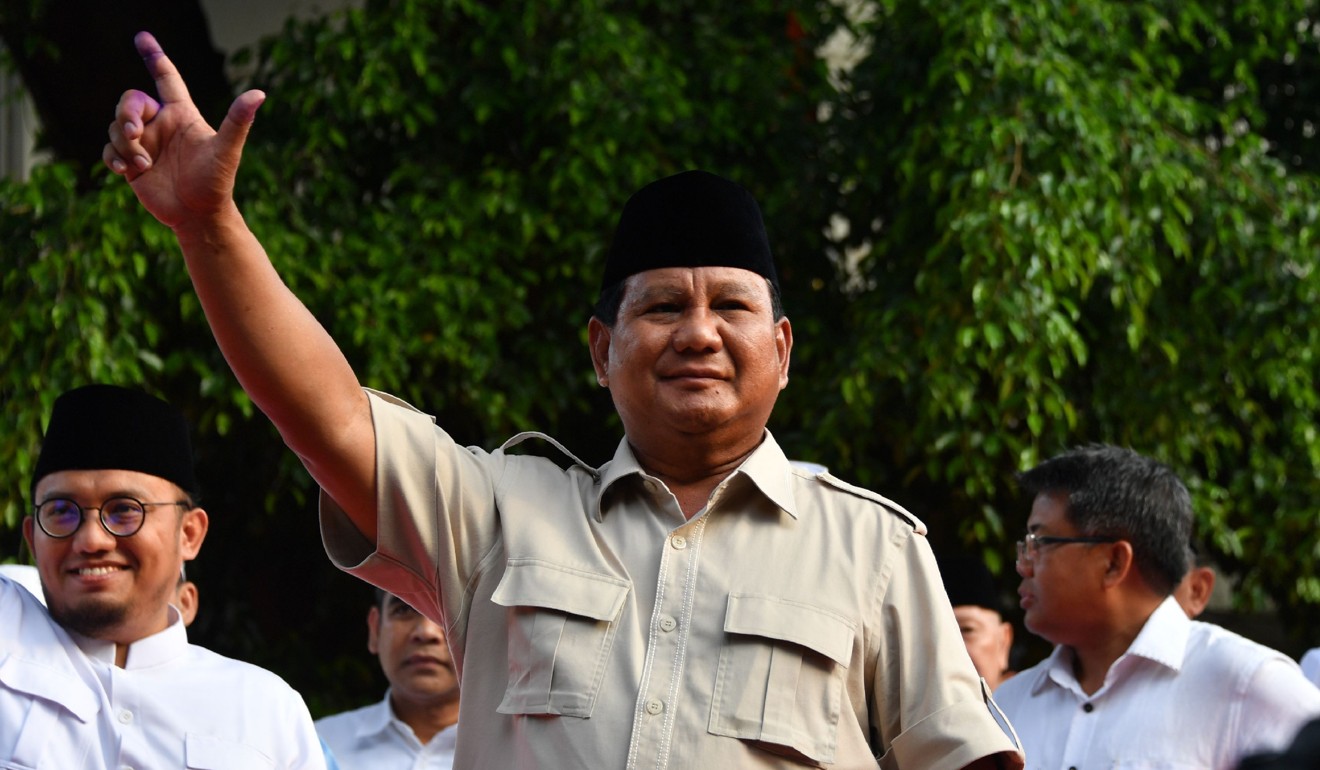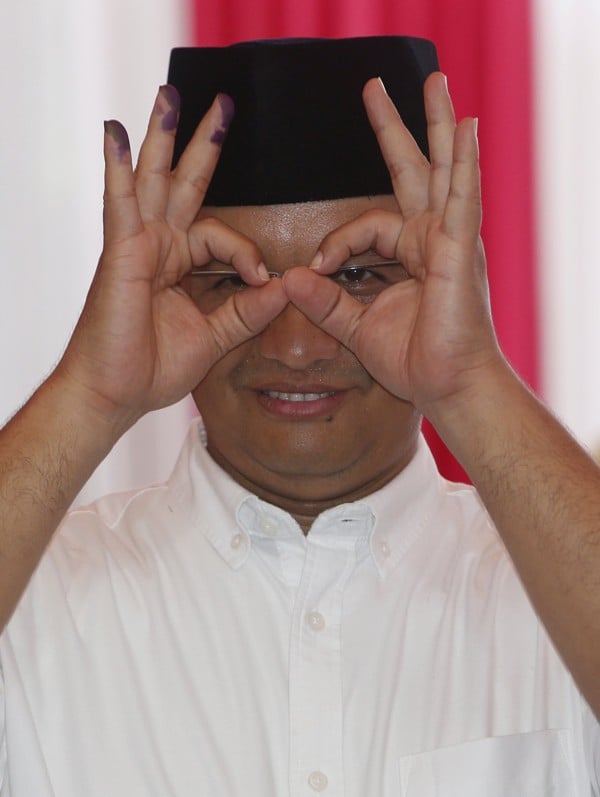Anies menyebutkan Reuni 212 merupakan cermin dari “persatuan Indonesia”.
Sodorin kaca yg besar buat anda ‘Nies! Jangan bicara ttg persatuan Indonesia, jk bibit2 intoleransi msh ada di ibu kota.
So, I don’t care what you say, just make your own sandwich #ShameOnYou4nies pic.twitter.com/DcHEkTzIdE— EasyPeasy (@Dwiyana_DKM) December 3, 2019
Jakarta governor Anies Baswedan: Islamism’s new hope for Indonesian presidency?
- Anies fuels speculation of tilt at the presidency by addressing rally of the 212 Islamist movement that orchestrated fall of his Christian predecessor Ahok
- Analysts say he is now a favoured pick among Islamists for the 2024 election

Jakarta Governor Anies Baswedan has fuelled speculation that he plans a tilt at the presidency by speaking at a rally held by the Islamist movement that helped orchestrate the fall of his Christian predecessor.
As Anies took to the stage on Monday for the 212 movement’s reunion rally, a crowd of tens of thousands greeted him with chants of “President! President”, while one of the organisers gushed that Indonesia would “succeed when its leader is Anies Baswedan”.
The 212 movement is named after the date – December 2, 2016 – of the Islamist group’s first protest against the former governor Basuki “Ahok” Tjahaja Purnama, which helped lead to the downfall of the ethnic Chinese leader and his jailing on charges of blasphemy.
Anies’ attendance on the third anniversary of that rally and the reception he received have raised eyebrows, fuelling suspicions that he is lining himself up as a contender for the 2024 presidential election and prompting critics to suggest he is willing to shed his image as a moderate to court the Islamist vote.
Indonesia, a country of over 260 million people, is officially secular but has the world’s largest Muslim-majority population. A growing tide of conservatism across age groups has led to deepening divisions in society.
On one side, there are those of other beliefs or who support a moderate, tolerant interpretation of Islam, while on the other side there are those who embrace a more hardline ideology, even to the extent of calling for an Islamic state. A growing number of middle-class, younger Indonesians are also embracing a social movement known as Hijrah, where they consciously change ways seen as flawed for purer habits espoused by the religion, including some women wearing the niqab, or face veil.
Politicians and public figures have had to recalibrate their political positions to keep up, with President Joko Widodo picking elderly cleric Ma’ruf Amin as his running mate in the presidential election this year.
Anies himself had highlighted in a paper he wrote as a PhD student in 2004 that “fertile ground exists for Islam-friendly political parties to attract considerable support from Muslim voters”, and analysts say he went on to tap this wellspring of support when contesting the 2017 gubernatorial election against Ahok. Analysts then said he was using Islam to woo support as he often attended events organised by Islamist groups.

At Monday’s rally, dressed in his brown civil-service uniform, Anies stood out among a sea of white-clad men. “My message is that diversity is not the only thing that makes Indonesia unique. Many other countries are as plural as Indonesia,” Anies told the tens of thousands who had gathered at Jakarta’s National Monument.
“What makes Indonesia different? It’s our national unity. This is what makes Indonesia great.”
While his message was welcomed by the Islamists, nationalists were quick to protest and, by Tuesday, the hashtag #ShameOnYou4nies had trended to the top of Twitter Indonesia.
“Anies said that the 212 reunion is a reflection of Indonesia’s unity. Put a big mirror in front of yourself. Do not talk about Indonesian unity if the seeds of intolerance are still here in the capital,” tweeted EasyPeasy@Dwiyana_DKM.
The 212 movement emerged as a powerful political force when it was formed in 2016 to call for Ahok to be jailed after a doctored video of the then governor appearing to insult the Koran went viral on social media. The video effectively ended Ahok’s hopes of re-election in the 2017 gubernatorial election – one of the city’s most racially charged and divisive votes – and he was subsequently convicted of blasphemy and imprisoned. He has since been released.
The 212 movement backed Anies during the 2017 vote, helping power him to victory.

Critics now suggest Anies hopes to further leverage the Islamist vote to propel him to the presidency.
A member of the ruling Indonesian Democratic Party-Struggle, Eva Kusuma Sundari, questioned why Anies had attended the event in his civil-service uniform. Doing so suggested he was there in an official capacity, when in fact Minister of Administrative and Bureaucratic Reform Tjahjo Kumolo had banned members of the civil service from attending the rally, she pointed out.
Eva said while Anies had a “right” to be at the rally, it was “regrettable”.
“He wishes to take care of his captive market … for sure this is for the 2024 presidential election,” she told the official Antara news agency.
POSTER BOY
The developments have left many onlookers wondering how Anies, a former education minister and rector of Paramadina University, an institution known for promoting moderate Islam, could have become the poster boy of a movement whose divisive politics runs counter to multiculturalism in Indonesia.
Islamists had previously placed their hopes on Prabowo Subianto – the losing candidate in this year’s presidential election – but abandoned him in October when he joined President Joko Widodo’s cabinet as defence minister.
In 2008, Foreign Policy magazine named the US-educated Anies, who earned his PhD in Philosophy from Northern Illinois University and a master’s degree in Public Policy from University of Maryland, as one of the top 100 public intellectuals in the world.
Analysts now say Anies, 50, is among the Islamists’ favoured picks to be the country’s next president.
“His Islamic credentials are far [greater] than Prabowo’s,” said Dodi Ambardi, a lecturer at the University of Gadjah Mada’s (UGM) social and political science department.

“The 212 group is always looking for a presidential candidate who could pave the way for them to push through with their Islamist agenda. Even though sometimes the candidate they support may not have Islamic credentials, like in the case of Prabowo,” said Dodi.
Ambardi said that should Anies decide to run for the presidency in 2024, he could well receive the backing of the 212 movement.
“This will depend on whether there are other competitive candidates. For now, I think Anies is the candidate considered the most suitable by the 212 group,” said Ambardi.
Arya Fernandes, a researcher at the Centre for Strategic and International Studies (CSIS), cautioned that while Anies was popular due to his position as Jakarta governor, he faced strong competition from other governors on Java island.
Anies speaks to many groups – nationalists, Islamists … hence in his statements, sometimes he is pro-Islamist, sometimes he is pro-nationalist
To stand for election, Anies must first be backed by a political party.
Aleksius Jemadu, a lecturer at the Pelita Harapan University, expected Anies to be pragmatic and said he was unlikely to display his political colours until nearer the time. Anies would be mindful that nationalist, secular parties accounted for more than 50 per cent of the votes, he said.
UGM lecturer Ambardi described Anies as a “catch-all politician”.
“Anies speaks to many groups – nationalists, Islamists … hence in his statements, sometimes he is pro-Islamist, sometimes he is pro-nationalist,” said Ambardi.
In August, Anies told the Islamic Defenders Front to “keep defending religion” during a speech at the organisation’s 21st-anniversary celebration. The front has been implicated in acts of harassment, intimidation, and mob violence against religious minorities, according to Human Rights Watch.

Arya of CSIS said Anies was an “open and moderate person” but that he was being influenced by political expediency. “Practical politics may have made him change his political choices and the way he conducts his politics, by approaching 212, the Islamic Defenders Front and others,” said Arya.
A Jakarta resident, Sani, said Anies would not make a good president because he had used “race and religion” to win the gubernatorial race. “Someone who can do anything to [achieve] his power, like he did in the Jakarta election, can also do anything when he is in power [as president],” Sani said.
Sani was “very dissatisfied” with Anies’ performance as Jakarta governor, criticising his lack of transparency in presenting a huge budget proposal for the city. “There was this mind-boggling allocation of 82 billion rupiah (US$5.8 million) to buy glue for schoolchildren,” said Sani. The incident, dubbed “the Aibon glue case”, triggered a public outcry.
The 212 movement comprises Islamist groups with varied goals. According to a 2018 report by the Institute for Policy Analysis of Conflict, the movement is made up chiefly of Salafi-inspired activists and conservative traditionalists.
The Salafi-inspired activists have the most clearly articulated long-term objectives: a greater public role for religious scholars known as ulama, sharia-inspired public policies, Muslim majority rule and Muslim control of the economy. They are careful to stay within accepted political bounds, and avoid calling for formal application of Islamic law or the creation of an Islamic state.
The conservative traditionalists are represented by the Islamic Defenders Front. They have a mass base and mobilisation capacity that the Salafis lack, enabling them to build tactical alliances for short-term mutual benefit with political candidates, despite the front’s reputation for thuggery.
Arya of CSIS said the political influence of the 212 movement had weakened as many of those who had joined the original demonstrations against Ahok sometimes disagreed with its choice of political candidates.
After the jailing of Ahok, many in 212 see their mission as having been fulfilled. “The 212 movement is now concentrated only in several cities. Its influence in the 2024 presidential elections is not going to be that big, so don’t look at 212 as the main variable for a victory,” Arya said. ■